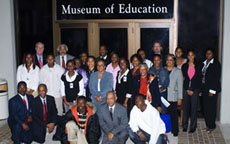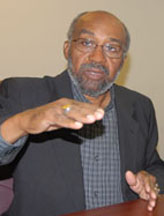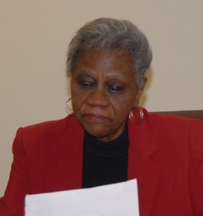

Curator's Statement |
|||||||||||
|
“The teachers knew what they had to do to prepare us for a better world. Not all parents, many of whom had not graduated from elementary school let alone high school, could guide our schooling, but they had great faith in the teachers. That is why the teachers worked so closely with parents, helping them to understand the importance of education so that we could get out of the cotton field. School was our ticket out, and the parents were saying ‘don’t go there to mess up.’ Our teachers and parents knew someday that there would be a better world, and they encouraged us to go forward.” Edgar E. Smith |
||||||||||
Magnolia Avenue High School was a remarkable place, and I wish I could have stayed in Vicksburg for months to locate documents and record more reflections. Dr. Smith's statement certainly captures the sense of hope for education as a means to better one's life. This experimental school seemed to have developed this spirit with a sense of thoughtfulness. Oh, how I wish I could locate their 330 page bulletin, Magnolia Builds Its Own Philosophy, a report, as noted in Rockefeller Foundation materials, "for a faculty study of local needs to determine suitable aims and objectives for the school’s program." There are so many other topics and themes that need to be documented—locating a good photograph of the school would be a fine beginning and as well as obtaining a copy of the school's 9 page mimeographed account of pupil-teacher activities on a democratic plan, “Report of Progress in Communication Skills.” Also, further recollections and full descriptions of Magnolia Avenue's activities known as cooperative planning among teachers need to be gathered. As I have visited the various sites of those participating members in the Secondary School Study, Magnolia Avenue High School materials, suggesting a modest but quite well-developed philosophy of education, cry out for a thoughtful educational historian to explore further the magic of this school. |
|||||||||||
While my visit to Vicksburg was not long enough, the stay could not have been more enjoyable thanks to the conscientious work of Thelma Rush. I was put at ease by her calm, gracious demeanour only to be astonished (well, impressed and intimidated) by her remarkable intellect. When engaged in conversation with her son, I delighted to hear her succinct, witty comments tossed into the discussions, often leaving the two of us speechless. As I am intrigued by Magnolia Avenue High School, I am equally intrigued by the knowledge and background of Mrs. Rush and the other alumni, each one suggesting a remarkable and important biography of an untold story for a southern city known for its Civil War participation but yet to fully discuss and discover their heritage in the “long civil rights movement.” |
|
||||||||||
My Vicksburg research trip holds another unanticipated moment of great joy—I drove downtown upon learning on Election Day evening, November 2008, that Barack Obama had been elected president. I stood among individuals I had never seen before—members of the Vicksburg African American community—holding hands, weeping, and singing. The moment was special and, after having spent the day hearing accounts of uncivil behavior from an earlier era, served as another reminder of change and hope for our country and for our schools. Craig Kridel |
|||||||||||

an institutional member of the International Coalition of Sites of Conscience
Museumofed@gmail.com



